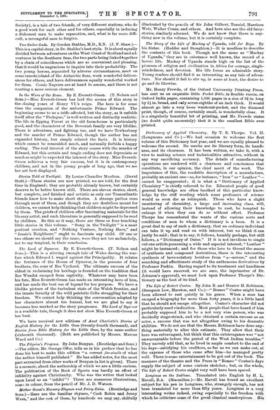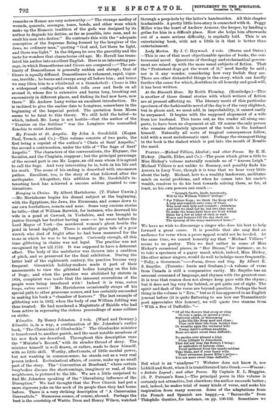Longinus on the Sublime. Translated into English by. H. L.
Havell, B.A. (DIacmillan.)—Mr. Havell has found an excellent subject for his pen in Longinus, who, strangely enough, has not been translated for more than fifty years. Longinus is a verz interesting writer indeed, owing especially to the freedom with, which he criticiaes some of the great classical masterpieges. remarks on Homer are very noteworthy :—" The strange medley of wounds, quarrels, revenges, tears, bonds, and other woes which make up the Homeric tradition of the gods was designed by its author to degrade his deities, as far as possible, into men, and to exalt his men into deities." He contrasts this with the " adequate conception of the Supreme Being formed by the lawgiver of the Jews, no ordinary man," quoting " God said, Let there be light, and there was light." In the Odyssey he sees the garrulity and the taste for wonders that characterise old age. Mr. Havell has trans- lated his author into excellent English. Here is an interesting pas- sage, in which Demosthenes and Cicero are compared :—" The sub- limity of Demosthenes is generally sudden and abrupt; that of Cicero is equally diffused. Demosthenes is vehement, rapid, vigor- ous, terrible ; he burns and sweeps away all before him ; and hence we may liken him to a whirlwind or a thunderbolt : Cicero is like a widespread conflagration which rolls over and feeds on all around it, whose fire is extensive and burns long, breaking out successively in different places, and finding its fuel now here, now there." Mr. Andrew Lang writes an excellent introduction. He is inclined to give the earlier date to Longinus, somewhere in the beginning of the Imperial period. The quotation from Moses seems to be fatal to this theory. We still hold the belief—to which, indeed, Mr. Lang is not hostile—that the author of the " Treatise on the Sublime " was the Longinus who counselled Zenobia to resist Aurelian.



















































 Previous page
Previous page